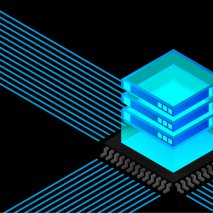When did users gain so much power?
Until comparatively recently, corporate organisations and independent technology providers could afford to develop very complex, wide-ranging ERP – enterprise resource management – software without paying much attention to how human beings might like to interact with them. Users didn’t get a look in. They were the tail, while ERP was the dog.
ERP is ‘big software’ remember; serious stuff. Vast manufacturing plants, logistics operations, human resources, integrated global supply chains and financial accounting, at the world’s biggest companies, run on ERP systems like SAP and Oracle. Hardly an Angry Birds download or some frothy little messaging app that helps you reorganise your social life in a slightly novel way.
And yet these forces of consumerisation have been bringing about radical change. Why?
Consumers are just business users on their day off
The answer is that mobile, cloud and the app revolution all happened. Specifically, for the first time in the age of computing, consumers were quicker to pick up and run with these breakthroughs than the business world. And consumers, after all, are just business users on their day off.
We saw new phenomena such as:
- Bring-Your-Own-Device (BYOD), where large organisations faced a data governance minefield caused by employees wishing to exercise greater productivity using their own smartphones and applications rather than the ones handed out by the IT dept.
- Stealth IT, where groups of users, unaware of the cybersecurity implications, would steadily grow impatient at the lack of Wi-Fi connectivity (the lubricant of all modern software applications) in their workplace. To enjoy the same broadband as in their homes, and public hotspots, they frequently installed their own wireless access points without telling the employer.
The point here is that, by growing accustomed to fast, immersive, mobile, intuitive software experiences in their personal lives, users had created a heightened expectation that they naturally wished to carry through to their business activities – including ERP. The effects of this both frightened and enlightened corporate bosses and technology developers. Frightened, because users showed how willing and able they were to break important data governance rules put their to protect their employers’ IP and brand reputations. Enlightened, because users were driven to do this through a desire to become significantly more productive and successful in their jobs. Hence why the conventional wisdom now is to embrace and facilitate these powerful forces, rather than ignore or suppress them.
Mobility means productivity
A huge part of the consumerisation trend relates to mobility. Who could have forecast a time when they would be more mobile, connected devices than people? And yet this ubiquity of 3G/4G mobile, Gigabit Wi-Fi and a surfeit of powerful smartphone and tablet devices to consume all this bandwidth, is today’s reality. What this means for ERP systems is:
- More opportunities for mobile data inputs and outputs. ERP systems are fed by, and produce, huge quantities of data. More and more of this is being accessed with mobile devices instead of traditional desktop based clients.
- More user demand for remote access. More ERP functionality is being made available via a mobile format so that more employees can access them from various work locations, at home, and on the move – making them more productive. This further supports workforce dynamism as organisations hire more part-time and contract employees.
- Better user uptake. As ERP systems evolve to accommodate mobile preferences, they make it easier for users to engage. This also makes for a better feedback loop as users input more ideas into the development cycle, creating accurate requirements for ERP customisation.
- More compelling ROI. The business case for ERP becomes more attractive in line with greater user engagement, as mobile access enables users to save the business time and money responding more quickly to customer demands. This produces additional commercial benefits such as faster time to market, more efficient business processes and greater customer satisfaction.
The ERP experience is becoming a bargaining chip
Some workers will spend considerably more time engaged with an ERP system than their closest relatives. Armed with the lessons learned from consumerisation and mobility phenomena, organisations understandably don’t want to make that experience unpleasant for users.
This desire is accelerating in the face of the most vocal and technologically savvy demographic of users yet – the so-called ‘millennials’. Millennials are young, recent inductees to the global employee pool who have spent their formative years growing up in a digital world. They are the tail that expects to wag the dog.
Attracting the best of this generation to come and work for an organisation will rely heavily on supporting a great IT experience. In a 2015 study of UK 13-17 year-olds, 79% said that UK businesses would have to update their technologies to meet their needs.
The seismic impact of consumerisation (and for that matter, cloud) has meant that even systems as complex and large as ERP are having to respond to user needs like never before.
In practical terms, this has encouraged the major ERP vendors to develop better user interfaces more akin to ‘social’ applications, and work to reduce the ‘clunkiness’ of features such as data visualisation.
But often these measures don’t go far enough to address the changes that organisations want in order to meet their unique requirements.
For ERP, cloud and consumerisation lead inexorably to another C: customisation. And that deserves another blog of its very own.

